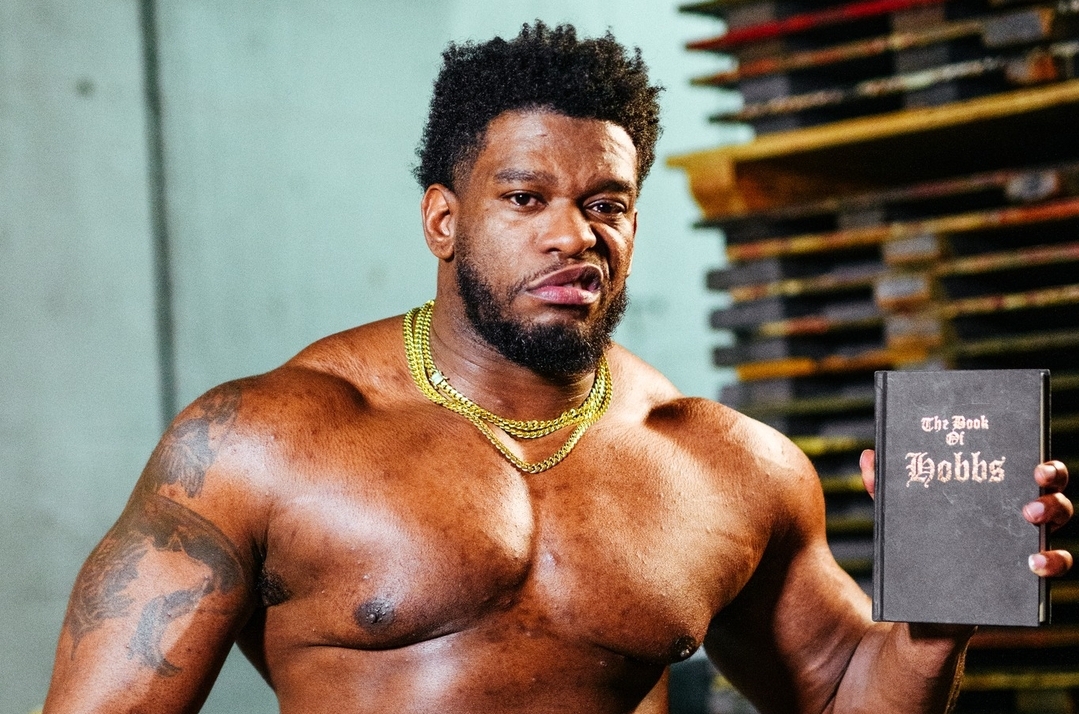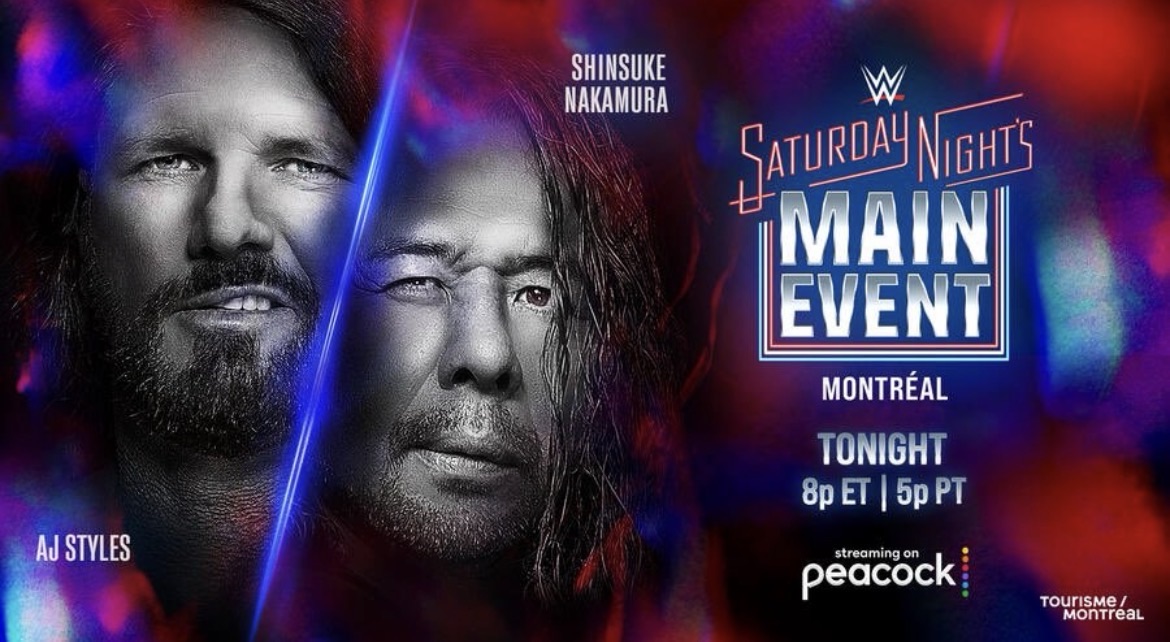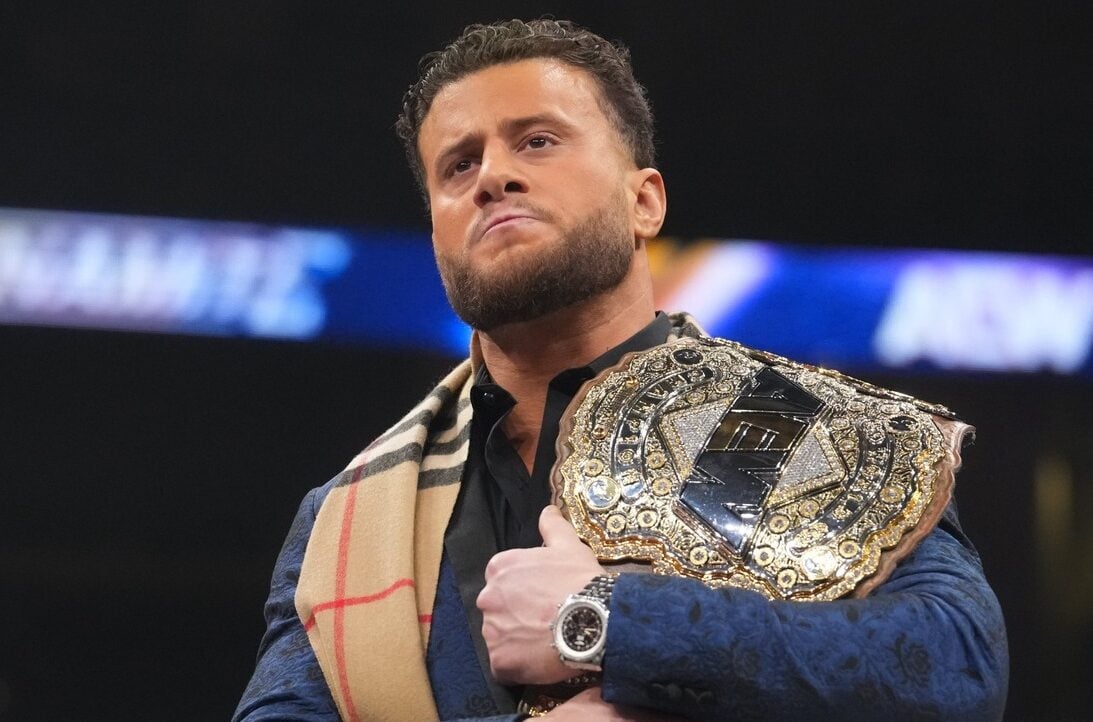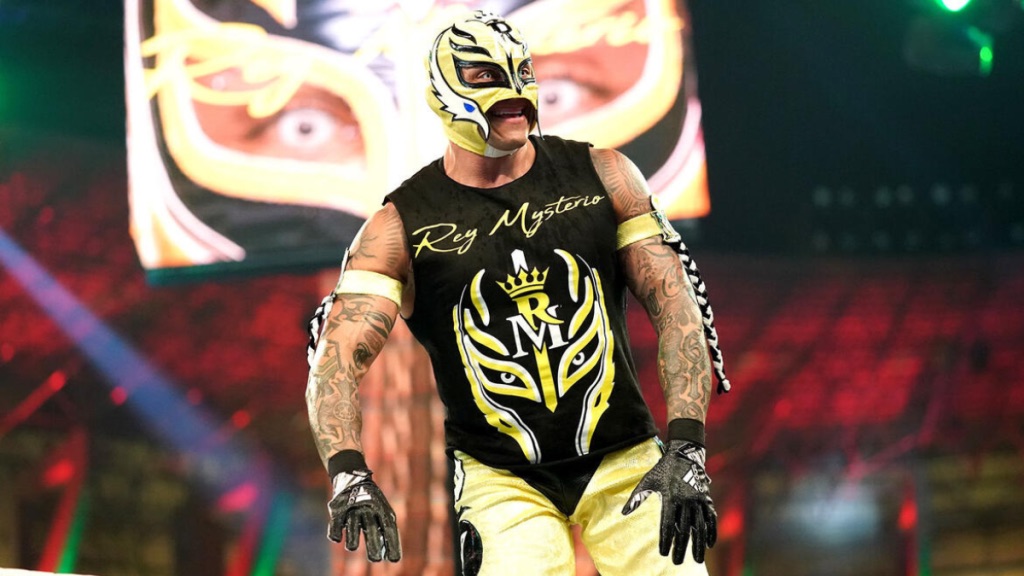
Money in the Bank is one of my favorite stipulations in wrestling. The direct creator of so many iconic moments in WWE history, it stands as one of the company’s last great original concepts. Of course, no stipulation is perfect, and it has also produced its fair share of mishaps and poor decisions, some of which are just baffling. Despite that, it is something I look forward to every year. In honor of the upcoming pay-per-view, I would like to revisit some of the best (and some of the worst) moments sparked by Money in the Bank since it was first introduced to the world nearly two decades ago.
Money in the Bank’s origin story varies slightly depending on who tells it, but everyone agrees that Chris Jericho, with help from Brian Gewirtz, introduced the concept. Gewirtz’s original pitch was the “Hollywood Dream” Match, a stipulation where the winner would have their “wish” granted. According to Jericho, the initial pitch was to have Rob Van Dam win the match and wish for the return of ECW, which would have provided a storyline explanation for One Night Stand, the one-off ECW reunion show that RVD had been pitching for several years and was finally granted.
The concept of the “wish” was changed to a title match at any time in the following year, after questions arose surrounding the logic of the wish itself. Specifically, why wouldn’t the winner of the match just ask for either world title? Ownership of the entire company? It would be difficult to explain why a wrestler wouldn’t request the absolute most that he could ask for, so a world title match is what it became, with the winner of the match carrying the contract around in a briefcase until he was ready to “cash in” his chance.

After being in danger of missing WrestleMania 21 entirely, Chris Jericho, Chris Benoit, Christian, Edge, Kane, and Shelton Benjamin became the first participants in the inaugural Money in the Bank ladder match. In a 2021 appearance on WWE’s The Bump, Edge recalled not wanting to be in the match because he didn’t want to be known as the “ladder match guy,” following his star-making clashes with the Hardyz and Dudley Boyz in the late 1990s and early 2000s. Of course, he quickly realized his initial apprehension was misguided when he won the WWE Championship for the first time only seven months later.
The WrestleMania 21 ladder match is among my favorite wrestling matches ever. It is a reckless, potentially career-shortening, car crash affair that doesn’t overstay its welcome (it’s barely fifteen minutes long) and has the right winner. Well, one of two potential right winners, though the likelihood of Shelton Benjamin winning a world championship was, unfortunately, never very high.
Edge’s run with the briefcase set the standard for all future heel Money in the Bank winners, and it became clear that most, if not all, future winners of the match should be heels. He held it until New Year’s Revolution 2006. After John Cena retained his WWE Championship in the Elimination Chamber, Vince McMahon appeared to announce that Edge was cashing in his contract. Two minutes and two Spears later, Edge was the new WWE Champion. It remains one of the great WWE moments of the 21st century, and the official birth of a main event star after years of flirting with singles success.

Even though Rob Van Dam was supposed to be in the WrestleMania 21 ladder match, he missed the show completely. That was not the case a year later. WrestleMania 22’s ladder match, while not as impressive as the first one, was still a very good one and probably should have opened the show. The entire cast of characters is different from the year before, save for Shelton Benjamin, who was the MVP of five of the six Money in the Bank matches to take place at WrestleMania. Like its predecessor, it’s another dangerous affair, with six men willing to take significant risks for entertainment purposes. 57-year-old Ric Flair took a suplex off the ladder, landing back first and yelling out in what may have been genuine agony.
RVD did not win the “Hollywood Dream Match” to wish for the return of ECW, but he did win the Money in the Bank match to receive a WWE Championship match at the show of his choosing. Conveniently, the second ECW One Night Stand show was two months away, so after winning, he announced ahead of time that he was cashing in on John Cena (who retained against Triple H in the main event of WrestleMania 22) at the Hammerstein Ballroom. The result was one of the most famous matches in the career of either man.
Rob Van Dam was like God to the ECW faithful, and he received a hero’s welcome like few others you’ll ever see. By contrast, John Cena, who’d been the top babyface in the company for over a year, got booed relentlessly. Of course, one of the most famous images from this match is the oversized “If Cena Wins, We Riot” poster, and considering the crowd, they might have actually done it. The second is Cena having his shirt thrown back at him after said crowd rejects it the first time. The match itself was broadly fine, but that’s not what people were there for. The crowd wanted to see their guy win the big one, and in a rare moment of WWE deciding against being spiteful toward the fans, their guy actually won the big one.
After the first referee is taken out, Edge interferes, puts Cena through a table, and attacks the replacement referee. He received “thank you Edge” chants from a crowd who disliked Cena so strongly that they were willing to overlook the fact that another non-ECW guy was the one making the save for RVD. Paul Heyman, the architect of ECW, runs out to make the count. Three seconds later, Rob Van Dam was the new WWE Champion. Of course, his reign was cut short after he and Sabu were arrested for speeding and possession of marijuana, but for that brief moment, RVD was at the top of the wrestling world. While Edge set the standard for the opportunistic heel cash-in, Rob Van Dam set the standard for the honorable babyface announcing their decision ahead of time. Two different approaches, but ones that have worked to varying degrees over the last nineteen years.

The WrestleManias 24 and 25 ladder matches are, to date, the only ones with the same winner in consecutive years.
In 2008, CM Punk was effectively an upper midcard act. He had brushes with main event wrestlers, but calling him a main eventer would be dishonest. At WrestleMania 24, against Bobby Lashley, MVP, Mr. Kennedy, Chris Jericho, Carlito, Shelton Benjamin, and John Morrison (the first eight-man Money in the Bank ladder match, by the way), Punk won the briefcase. He did not hold it for very long, as just under three months later, after being drafted to Raw the week prior, he cashed in on Edge following a Batista beatdown. With that, Punk was now the World Heavyweight Championship.
Where the Rob Van Dam cash-in was a moment of WWE opting to do right by the fans, the Punk reign that followed his cash-in was more of that classic McMahon spite that permeated through years of programming. He held the World Heavyweight Championship for 69 days before he was attacked at Unforgiven by Legacy. Randy Orton punted him in the head, resulting in Punk being prevented from competing in the Championship Scramble later in the night, ending his reign in the process. The World Heavyweight Champion lost his championship in a match he was not in. Not because he was injured or being punished for something, but because he was simply written out of the match. Unfortunate. Punk had slightly better luck next year, though. I guess.
The WrestleMania 25 ladder match is one of two good things on that show. In what felt like an attempt to redo Punk’s 2008, he won the briefcase. Again. This time, he cashed in on Jeff Hardy at Extreme Rules after Hardy retained the World Heavyweight Championship against Edge. Edge sure does come up a lot in these, doesn’t he? That win temporarily pushed Punk into the main event, though it wasn’t for long. The defining moment of the reign is the Hardy feud, which culminated with the TLC match at SummerSlam and the subsequent steel cage match that doubled as Hardy’s last match in WWE for almost eight years.
Undertaker won the title from him at Hell In A Cell later in the year in what amounted to a glorified squash match. At least the reign was longer.
Money in the Bank 2011 was the second show since the ladder match was moved off of WrestleMania and given its own pay-per-view. A year earlier, The Miz won the briefcase for a WWE Championship match, cashed in on John Cena, and had one of the worst WrestleMania main events of all time earlier in 2011. A match that originally ended in a double countout and only existed to motivate the Cena-Rock match WWE had wanted for several years.
Thankfully, in 2011, WWE got one of the Money in the Bank winners very right. Daniel Bryan, who signed with WWE in 2010 (but was fired for choking out ring announcer Justin Roberts with his own tie), got over with the WWE fans very quickly.
After a year that included him feuding with The Miz and winning the United States Championship, Bryan won the SmackDown Money in the Bank briefcase, ensuring him a World Heavyweight Championship match at any point in the next year. Bryan pledged to cash in at WrestleMania 28, taking the honorable babyface route of announcing the when and where of his cash-in in advance.
After being attacked by Mark Henry and Big Show repeatedly, Bryan abandoned that plan and cashed in at TLC, the last pay-per-view of 2011. Big Show beat Mark Henry for the World Heavyweight Championship, and after Henry attacked him, Bryan ran to the ring to capitalize. With that, Bryan became champion. Bryan later expressed regret for going back on his word, but the regret quickly turned into arrogance and by the events of WrestleMania 28, Bryan was a full heel. He lost to Sheamus at the show in eighteen seconds, much to the chagrin of fans. But, two years later, he won the unified titles in the main event, so he did have the last laugh. The success of Bryan’s cash-in produced an upper midcard heel who developed into a main event babyface, and without it, there is a chance that Bryan’s rise to the top takes even longer than it did.
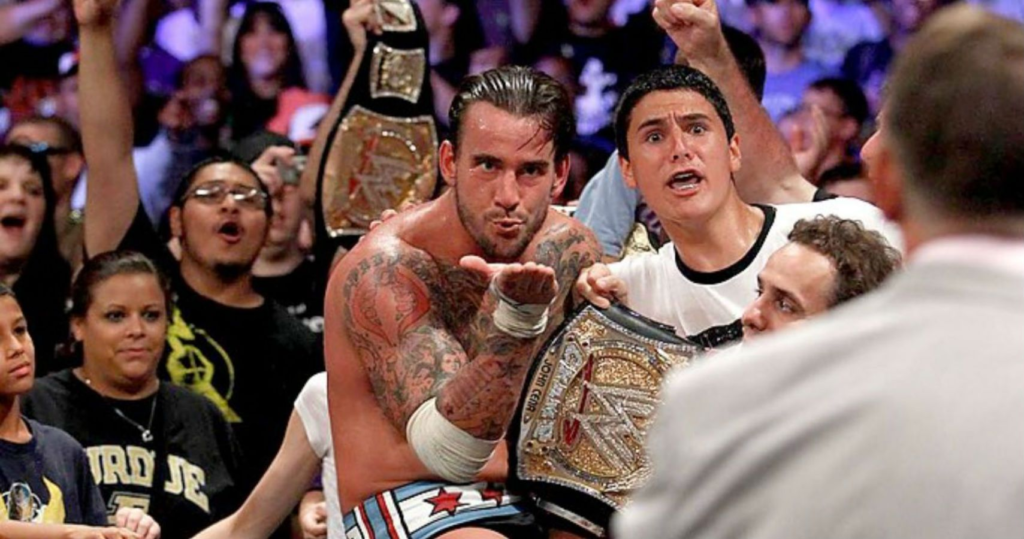
The irony of an article primarily about multi-person ladder matches is that the most important thing to take place at a Money in the Bank pay-per-view is not one of the ladder matches itself. Nor is it a cash-in. That is not an indictment of the quality of those matches, but it is emblematic of how great John Cena vs. CM Punk is.
By now, you’ve probably heard the story a thousand times, but it’s a great story, so I’ll tell it again. We begin with CM Punk’s Pipe Bomb promo, a loosely scripted airing of grievances with WWE management. He criticized the company’s direction and expressed his dissatisfaction with his position in the company, specifically that The Rock could come back after seven years away and immediately get a WrestleMania main event. Punk had been with the company since 2005 and, despite holding world championships, was never particularly close to that spot. He also announced that his WWE contract was expiring on the night of Money in the Bank and that he intended to leave the company with the WWE Championship if he won it from John Cena, saying that he’d defend it in Ring of Honor and New Japan Pro Wrestling. Vince McMahon threatened to fire Cena if he lost the title. Thus, one of the most heated championship matches of the 21st century was made official. Punk-Cena, in the Allstate Arena, in front of CM Punk’s home crowd.
The match itself is, in my opinion, the single greatest main event match in company history. Both Punk and Cena delivered outstanding performances, showcasing their in-ring abilities and chemistry. There are criticisms of parts of this match being clunky and that is true, but those things are less important when so much of the work is incredible and the crowd is that hot for all 34 minutes.
In the closing stretch, Vince McMahon and John Laurinaitis attempted to interfere to ensure Cena’s victory. Cena, determined to win the match fairly, stopped Laurinaitis from calling for the bell in yet another reference to the Montreal Screwjob, almost fourteen years and a Bret Hart-Shawn Michaels reconciliation after it happened. The distraction allowed Punk to capitalize and hit Cena with the Go to Sleep, securing a victory and the WWE Championship.
Following his victory, Punk quickly exited the ring and escaped through the crowd, holding the WWE Championship high and blowing McMahon a goodbye kiss. Punk did not actually have a new contract, as he’d only agreed a two-day extension to get through the show, but everyone was under the assumption that he was going to sign a new contract, which he did. His departure with the title led to WWE holding a tournament to crown a new champion.
Only two weeks later, Punk returned to set up a title unification match against new champion John Cena at SummerSlam 2011. Punk retained there as well, in another heated match that was not as good as the one they had a month earlier, but still great.
Then, Alberto Del Rio, who won the other ladder match at that year’s Money in the Bank, cashed in on CM Punk.
No thank you.

By the time Money in the Bank 2014 took place, The Shield was broken up. It never felt like the trio were destined to last forever, as it seemed like WWE had main event plans for Roman Reigns, Dean Ambrose, and Seth Rollins. Reigns was clearly marked as the next big babyface, as John Cena’s years as a full-time wrestler were winding down. Ambrose was the first of the trio to win singles gold and seemed like someone who was rarely, if ever, going to be lower down the card than Intercontinental Championship contention. Rollins was in his athletic prime and already had the endorsement of Triple H, both on and off-screen. He was also a heel, responsible for the breakup of The Shield.
After winning the briefcase in 2014, Rollins held it for the rest of the year and into next year. Questions about when he’d cash in began to rise, as at that point, he was the second-longest holder of the contract in Money in the Bank history, at 273 days (Edge was #1 at 280 days and he was passed by Damian Priest this past year, at 281 days). Then we finally got our answer.
The main event of WrestleMania 31 featured Brock Lesnar defending the WWE World Heavyweight Championship against Roman Reigns. Reigns won the 2015 Royal Rumble match, guaranteeing him the main event of WrestleMania in the process. Unfortunately for Reigns, he was one of the most despised babyfaces in recent history, due in large part to him not being Daniel Bryan.
The match is one of the greatest WrestleMania main events of all time, a genuinely surprising outcome considering how low fans were on both wrestlers at the time. They hit each other hard and were having the match one would hope for between those two, a far cry from the finisher-fests that all of their subsequent matches turned into. Despite that, fans still did not want to see either man win.
As both Lesnar and Reigns were down, Rollins’ music hit, and he ran down the ramp with the briefcase. Rollins cashed in the contract, turning the match into a triple threat and becoming the first person to cash in at WrestleMania (and so far, the only person to do it in the WrestleMania main event). Rollins himself said later that he did not know if the idea to cash in would be approved until he got word halfway through the show that they were going ahead with the pitch and that he was winning the title.
After Curb Stomping Reigns, Rollins pinned him to win the WWE World Heavyweight Championship, his first world title win in WWE and perhaps the single most enduring image to be produced as a result of the Money in the Bank stipulation. Michael Cole dubbed it the “Heist of the Century,” and it is not hard to see why. WWE backed themselves into a corner by promoting a main event that very few fans wanted to see, and instead of pushing forward with a Reigns title win that people were not interested in, they pulled off a minor booking miracle and a champion that the fans wanted to root for is how the show ended. Rollins’ reign ended unexpectedly after he blew out his knee at a November house show in a match against Kane, but the sheer chaos of the cash-in is enough to look past how things went when he actually won the championship. A success if there ever was one.

At Money in the Bank 2016, Roman Reigns defended his WWE World Heavyweight Championship against Seth Rollins. Rollins, who had been out since the prior November after blowing out his knee at a house show, was determined to reclaim the title he’d never lost. The bout between Reigns and Rollins was the main event of the night, and it was a very good match, albeit one that lacked the dramatic interpersonal tension one may have hoped for considering their history.
Reigns used his power moves to dominate early, while Rollins countered with agility. Both competitors kicked out of big moves, with Rollins kicking out of a Spear late in the match and Reigns showcased his Superman-like resilience by kicking out of everything Rollins threw at him. Almost everything, at least.
The match reached its climax when Seth Rollins countered a Spear from Reigns into a Pedigree. He followed it up with another Pedigree to secure the pinfall victory, thus becoming the new WWE World Heavyweight Champion. Rollins’ win was met with a resoundingly positive reaction (in part because it meant Reigns’ reign was over). But, the drama didn’t end with Rollins’ victory. Immediately after the match, Dean Ambrose, who had won the Money in the Bank contract earlier in the evening, cashed in.
Ambrose attacked Rollins with the briefcase and hit him with Dirty Deeds, pinning him to become the new WWE World Heavyweight Champion. All three former Shield members held the title on the same night, and it was the just the second time a Money in the Bank winner cashed in on the same night that they won the briefcase. A significant moment and one of the defining pieces of The Shield’s story as a trio.

There are some glaring issues with this match, and none of them are the fault of the competitors. For them, this was history. Money in the Bank as a concept had existed since 2005, and it took twelve years for the women to have their first crack at it. Becky Lynch, Charlotte Flair, Natalya, Tamina, and Carmella. Of these five competitors, one may think that Flair or Lynch would emerge victorious. They were, and are, two of the winningest women in WWE history, and one may think that one of the prestigious “Four Horsewomen” would be the first to hold the women’s Money in the Bank contract. At the very least, one may think that the first winner of the women’s Money in the Bank contract would be a woman.
It was James Ellsworth.
Technically, it was Carmella, but it was Carmella via James Ellsworth. Two referees disagreed with the decision and Daniel Bryan, who became the General Manager of SmackDown when WWE reinstated the brand split, determined that they would resolve the issue on SmackDown. The resolution was to run the match back on the June 27 episode, nine days after the original debacle took place. The match was longer, noticeably better, and this time, Carmella won the briefcase herself.
After holding it for 287 days (the longest run with the briefcase ever) and several failed attempts, she cashed in on Charlotte on the April 10, 2018 episode of SmackDown. She received a thunderous ovation, and it was a well-earned moment for someone who put a lot of work in over the years, stepping out of the shadows of Enzo Amore & Big Cass and developing into someone that the crowd wanted to see succeed. Mella is money, indeed.

Baron Corbin was not the first wrestler to win Money in the Bank and be unsuccessful in his world championship pursuit. John Cena is. Cena won in 2012, cashed in on CM Punk, and won the match by disqualification. Meaning, the title did not change hands. However, Baron Corbin’s unsuccessful cash-in is the first truly embarrassing one. Damien Sandow did lose to Cena in 2013. However, Sandow was never going to be a world champion in WWE. On the other hand, WWE seemed to like Baron Corbin, which is why it is surprising that he lost his championship match in the way he did.
The 2017 ladder match itself is a lowkey favorite of mine. AJ Styles, Shinsuke Nakamura, Kevin Owens, Sami Zayn, Dolph Ziggler, and Baron Corbin. Styles and Nakamura had history in New Japan Pro Wrestling, and when they stared each other down, the crowd reacted accordingly. This also doubled as the planting of the seeds for their clash at WrestleMania several months later. Kevin Owens and Sami Zayn had history, going back to their days in Ring of Honor, and the latter was the former’s first real feud in NXT upon Owens’ arrival in WWE. Ziggler was the gatekeeper for NXT call-ups for years, and he was Corbin’s first feud on the main roster. Essentially, everyone in this match knew each other, and the result was a good match that turned into a great one in the second half. After years of Money in the Bank matches that were just okay with cash-ins that saved the stipulation from being a lost cause, this was not that.
At the end of nearly half an hour, Corbin won the briefcase. Styles and Nakamura appeared to be the final two standing, but Corbin played the role of opportunist to great effect, pushing the ladder over and setting it up so that he could win the match uncontested. Corbin was not the preferred winner, but over the years, Money in the Bank became a heel-centric stipulation and Corbin was the freshest face of the field, so his win did make sense. Besides, if he cashed in successfully, he’d be the one who ended the misguided Jinder Mahal WWE Championship reign. Right?
From the moment Corbin won the briefcase, it felt that he was doomed. He went 2-1 in televised matches, but one of them was a tag team match and the other was against Sami Zayn, who spent most of the last year losing. After a John Cena-Jinder Mahal SmackDown main event, Corbin cashed in on Mahal. In the amount of time it took for the cash-in to be made official, Cena recovered enough to distract Corbin. Mahal used that distraction to win with a flash pin in six seconds. With that, any remaining interest in Corbin as an upper midcard act vanished. A flash pin loss. Corbin joined Damien Sandow as one of two wrestlers to lose their cash-in match outright. Sandow was at least afforded a real match before losing. Corbin got nothing. Sometimes WWE gets things right, but for no reason at all, they got this one very unnecessarily wrong.

Brock Lesnar stifled the momentum of every wrestler in this match by winning something he wasn’t in, after Mustafa Ali inexplicably did not take down the briefcase despite no one being around him. Then, after winning (and losing) the Universal Championship in a month-long period, he ended Kofi Kingston’s WWE Championship reign two months later because Vince McMahon wanted people to watch the first SmackDown on Fox. 2019 was not a good year.

The COVID-19 pandemic brought most of the world to a halt. For WWE, it was business as usual. Professional wrestling was one of the few industries that didn’t shut down during the worst of the pandemic, as both WWE and All Elite Wrestling taped their shows from different parts of Florida. WWE relocated to the Performance Center, producing television in front of no fans and operating with a very light production team. They even pre-taped WrestleMania, a first-time occurrence.
The pandemic also provided wrestling promotions with the opportunity to do things they had never done before, particularly in the rise of “cinematic matches.” AEW presented the first Stadium Stampede match at 2020’s Double or Nothing event, and that stipulation (as well as its sister stipulation, Anarchy in the Arena) has become a mainstay. WWE produced the Boneyard and Firefly Funhouse matches, both of which are looked back at fondly by those who suffered through pandemic-era wrestling.
The 2020 Money in the Bank ladder match was unique in that it was the first and only one where both the men’s and women’s matches took place at the same time. It was even more unique because it took place at Titan Towers, WWE’s longtime base of operations. The competitors in both matches started at the bottom and had to make it to the roof, where a wrestling ring and both briefcases awaited them. On the men’s side: AJ Styles, Aleister Black, Baron Corbin, Daniel Bryan, Rey Mysterio, and Otis. On the women’s side: Asuka, Carmella, Dana Brooke, Lacey Evans, Nia Jax, and Shayna Baszler. The match is mostly fun, with the crew opting to go with a less serious approach, even featuring some cameos that have aged horribly and others that were fun to see.
Asuka unhooked the briefcase to win the match. After a brawl with Nia Jax and Lacey Evans on the roof, Asuka pushed Evans off the ladder into Jax, rendering them both incapacitated. She climbed the ladder and secured the briefcase with relative ease after that, becoming the first person in the concurrent matches to emerge victorious.
Five minutes later, shenanigans ensued. As AJ Styles and Baron Corbin fought atop the ladder, they both began trying to unhook it. Elias (who was not in the match) appeared and hit Corbin with a guitar, causing him to drop the briefcase. Styles also did not have a secure grip on it, so he fumbled it and Otis, who was on the ground, caught the falling briefcase. Thus, Otis was Mr. Money in the Bank.
On the following episode of Raw, Becky Lynch, then the Raw Women’s Champion, announced her pregnancy. She also announced that the ladder match was retroactively for her title since Lynch was going on maternity leave, meaning that Asuka was the new Raw Women’s Champion. The two of them were overcome with emotion, and it was great to see, even though I do wish they announced that it was a title match going into the pay-per-view, as it would have added even more stakes. Otis lost the briefcase to The Miz, one of only two wrestlers to lose the briefcase in a match before getting the opportunity to cash in. The other one? Mr. Kennedy in 2007.
Miz used Otis’ contract to cash in on WWE Champion Drew McIntyre after an Elimination Chamber match, and over a decade removed from Miz’s first cash-in for the WWE Championship, he did it again. Miz held the title for eight days before losing it to Bobby Lashley. It is unfortunate that’s how it went for Otis, but the match itself was very fun and the finish to the match was one that I was surprised had never been considered before.

Sometimes, wrestling is a feel-good story.
The 2021 men’s Money in the Bank ladder match is one of the best ever, bringing back some of the intensity that many of the matches over the last five years lacked. It did not hurt that the match had one of the best lineups ever, with John Morrison, Drew McIntyre, Shinsuke Nakamura, Seth Rollins, Riddle, Kevin Owens, and Big E being seven of the best names you could have put in that match at the time.
Suplexes through ladders, suplexes off ladders, an absolutely brutal Falcon Arrow from Seth Rollins to Kevin Owens while the ladder was on its side, Ricochet’s high-flying brilliance, a wildly impressive tope from Drew McIntyre to the rest of the field, and many more moves that will leave you impressed. It was the first time in a while that the competitors involved really embraced what multi-person ladder matches could and should be, and at the end of it all, an unexpected but more than welcome winner emerged. Big E won the ladder match, becoming the first Black American person to hold the briefcase and setting him up for a world title opportunity in the future.
The afternoon before the September 13 episode of Raw, Big E tweeted that he intended to cash in on that night’s show. Bobby Lashley vs. Randy Orton in a title match was already set, and the belief among fans was that he would do a Rollins-like cash-in and make the match a Triple Threat. Instead, he cashed in at the end of the match, after Lashley retained, and won his first WWE Championship. The crowd erupted. Kofi Kingston and Xavier Woods celebrated with him, just as Big E and Woods had celebrated Kingston’s own WWE Championship win at WrestleMania two and a half years earlier.
I try to stay out of online discourse, but I could not avoid the conversations about if Big E should have cashed in the way he did. Was there a better option? Maybe. There’s a better option for everything. Did it matter? Not at that moment. Big E, a wrestler who people were rooting for since he debuted, could finally call himself a world champion. One of only four Black world champions in WWE history. Sometimes, a good thing is just a good thing, even if the next steps are rough.

Austin Theory won the briefcase, was repeatedly stopped from cashing in, gave up on cashing in on Roman Reigns and cashed in on United States Champion Seth Rollins instead, then lost that match too.
What was the point?

In the last two years, WWE has made a habit of running their non-“Big 4” shows (Royal Rumble, WrestleMania, SummerSlam, and Survivor Series) outside of the United States. Last year’s Money in the Bank pay-per-view took place at the O2 Arena in London.
Damian Priest and Iyo Sky won the men’s and women’s ladder matches, respectively. Sky cashed in on Bianca Belair at SummerSlam, winning the Women’s Championship and embarking on the most consistently good reign with that title in a very long time, losing it to Bayley in one of the best matches of this past WrestleMania weekend. It was very easy to have one of the greatest wrestlers of this generation show why she’s been in those conversations since she was in her early 20s. It was less straightforward with Damian Priest.
Priest enjoyed modest success prior to winning last year, but after his win, certain things started going right for him. He and Finn Balor captured the Tag Team Championships and began to win more matches, but much like Theory the year before, every cash-in attempt that was made was thwarted by his opponents or an outside rival. For almost 300 days, people questioned when he would cash in. Some questioned if he’d even cash in at all.

Drew McIntyre vs. Seth Rollins for Rollins’ World Heavyweight Championship was the opening match of Night 2 of WrestleMania 40. The match was great, with the two of them packing twenty minutes of action into half the time, and wrestling with genuine urgency. McIntyre won the title after hitting multiple Claymore kicks, the last of which rendered Rollins completely out of it. In a moment of significant arrogance, McIntyre taunted guest commentator CM Punk, and Punk responded by knocking him off the announce table, giving Priest an opening to cash in, to a rapturous reaction. Like Rollins at WrestleMania nine years before, or Edge nearly two decades ago, the opportunistic heel won the world title in the most dramatic way possible. Damian Priest often divides opinion, but his cash-in was what Money in the Bank is all about.

Money in the Bank 2024 emanates from Toronto, Canada on July 6. It has the potential to be an interesting show. The men’s ladder match features Jey Uso, Carmelo Hayes, Andrade, Chad Gable, LA Knight, and Drew McIntyre. The women’s match stars Iyo Sky, Chelsea Green, Lyra Valkyria, Tiffany Stratton, Naomi, and Zoey Stark. Sky will have the chance to join the aforementioned CM Punk as the only back-to-back winner of the contract, while McIntyre will have the chance to win the contract and once again go after the World Heavyweight Championship he lost in such dramatic fashion at WrestleMania 40.
Elsewhere, The Bloodline, remade in self-appointed Head of the Table Solo Sikoa’s image while Roman Reigns has been on hiatus and made up of Sikoa, Tama Tonga, Tonga Loa, and Jacob Fatu will be in trios action. Cody Rhodes is once again The Bloodline’s main target, but he has backup from two men who’ve also been wronged by Sikoa and crew. Randy Orton and Kevin Owens.
It remains to be seen which three members of The Bloodline will wrestle Rhodes, Orton, and Owens, but this match should be an enjoyable one, and may even be capped off by the return of Reigns after wise man Paul Heyman was attacked by Sikoa, Fatu, Tonga, and Loa.
Bron Breakker will take on Sami Zayn for the Intercontinental Championship in a match that is as much about the title as it is about Breakker proving that he’s somebody to pay attention to on the Raw roster.
Damian Priest and Seth Rollins will also be facing off for Priest’s World Heavyweight Championship match, which was made official after Rollins returned on the June 17 episode of Raw.Rollins was the inaugural holder of this version of the World Heavyweight Championship, reigning for close to a year before the loss to McIntyre. If Rollins loses, he can never challenge for the title so long as Priest is the champion. If Priest loses, he has to leave The Judgment Day. With Liv Morgan lurking around, anything is possible, I suppose.


